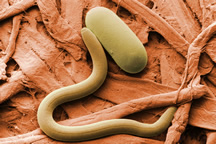This page has been archived and is being provided for reference purposes only. The page is no longer being updated, and therefore, links on the page may be invalid.
|
|
New Soybean Resists Nematodes and Pathogens
By Jim CoreSeptember 29, 2005
High seed yield and unique resistance to nematodes and several diseases are the key qualities of new soybean lines developed by the Agricultural Research Service (ARS) and the Tennessee Agricultural Experiment Station in Knoxville.
The release of soybean lines JTN-5303 and JTN-5503 was announced today in Jackson, Tenn., during a ceremony hosted jointly by ARS and the experiment station.
According to Prakash R. Arelli, a geneticist at the ARS Nematology Research Unit in Jackson, the new lines have broad resistance to multiple races of soybean cyst nematode (SCN). This is the most destructive soybean pest in the United States, causing an annual estimated loss of $1.1 billion.
JTN-5303 is a cross between the cultivars Caviness and Anand, while JTN-5503 is a cross between Fowler and Manokin. Traditional breeding techniques and marker-assisted selection were used to track resistance genes. Both lines have yields significantly higher than the popular cultivars Hartwig, Fowler and Anand, and have Hartwig-type resistance to widespread nematode populations.
Both lines were also selected for resistance to several fungal pathogens, including sudden death syndrome, stem canker, and frogeye leaf spot, with moderate resistance to charcoal rot. Previous lines have never had this unique combination of resistance to both SCN and pathogens.
The new releases are in Maturity Group V. Maturity groups are used to designate which varieties are best suited for production in specific geographic regions. The new lines are well adapted to production in the Mid South.
Arelli developed the new lines with Vince Pantalone and Fred Allen, geneticists at the University of Tennessee. They were assisted by ARS scientists Lawrence Young, Arelli's research leader, and Alemu Mengistu, a soybean pathologist.
These lines are expected to be ideal choices for breeders for use as parents in developing cultivars in early maturity groups that reduce soybean yield losses and reduce the need for pesticides. ARS is the U.S. Department of Agriculture's chief scientific research agency.

